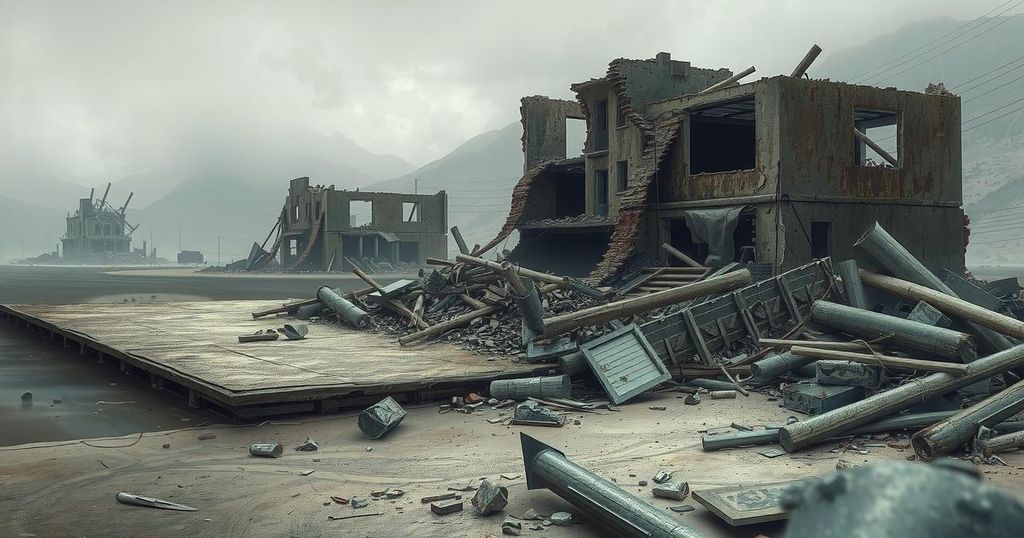World news
AMERICA, ANDREW NATSIOS, ASIA, CURRENT_AFFAIRS, DARTS, DONALD TRUMP, EL, GEORGE W BUSH, HUMANITARIAN AID, INTERNATIONAL AID, MYANMAR, NATURAL DISASTERS, RESCUE OPERATIONS, STATE DEPARTMENT, SYRIA, US, US AGENCY FOR INTERNATIONAL DEVELOPMENT, US DEPARTMENT OF STATE, USAID
Fatima Khan
0 Comments
Impact of USAID Cuts on U.S. Disaster Response in Myanmar
Recent cuts to USAID have limited the U.S. response to the devastating earthquake in Myanmar, as highlighted by former officials. The absence of Disaster Assistance Response Teams and key personnel has hindered rescue efforts during this critical period. Despite a pledge of financial support, the U.S.’s inability to deploy rescue teams raises concerns regarding its role in international disaster aid.
Recent cuts to the United States Agency for International Development (USAID) have hindered the U.S. response to the devastating earthquake in Myanmar, according to three former senior officials. A former USAID mission director lamented that “America has been on the sidelines” during this humanitarian crisis, while another official pointed out that the U.S. was not present during the crucial rescue period, potentially costing lives in the process.
The earthquake, which registered a 7.7 magnitude, resulted in at least 2,700 fatalities and many more injured or missing. Historically, USAID has mobilized specialized Disaster Assistance Response Teams (DARTs) to respond to major disasters, yet recent organizational changes have hindered this response. On average, DARTs can deploy approximately 200 rescuers equipped with essential tools and resources needed for effective disaster response.
In light of the earthquake, the U.S. Department of State indicated that a small advisory team from their regional base was dispatched to Myanmar, comprising only three advisers rather than rescue specialists. The State Department also pledged $2 million for humanitarian assistance to earthquake-affected regions, which is notably less than prior aid amounts during similar crises.
Critics have cited the management of USAID under the current administration as a significant contributor to ineffective responses. Key officials from the Bureau of Humanitarian Assistance were reportedly placed on administrative leave just as the earthquake occurred, hampering efforts to deploy the necessary rescue teams. Andrew Natsios, a former USAID administrator, noted that the dismissal of experienced personnel left no one to mobilize a response team.
Former officials reported that logistical contracts necessary for transporting rescue resources had been terminated due to budget cuts, further impeding U.S. responses in emergencies. Jeremy Konyndyk, who previously led the Office of US Foreign Disaster Assistance, stated, “It is the first time… that the US has simply not responded meaningfully to a major disaster,” emphasizing the decreasing capacity of the U.S. in providing critical disaster aid.
While the U.S. State Department counters that logistical limitations do not affect disaster relief, former officials disagree. Konyndyk criticized the notion that effective assistance could be provided without a physical presence in the affected areas, stating such claims are unrealistic. Meanwhile, Chris Milligan underscored the importance of U.S. involvement, suggesting that its absence marked a significant decline in the nation’s international influence.
Although the State Department confirmed it would not deploy a DART team, officials asserted that ongoing lifesaving programs and strategic investments would continue. However, the effectiveness of these programs without direct ground involvement remains a subject of debate, as previous capacities have not only been delayed but also diminished.
In summary, recent cuts to USAID have reportedly minimized the United States’ ability to effectively respond to the earthquake crisis in Myanmar, resulting in a delayed and inadequate aid deployment. Critiques from former officials highlight the impact of administrative decisions on rescue operations and raise concerns about the U.S. losing its position as a leading player in international disaster response. The U.S. government continues to assert its commitment to humanitarian aid, but the absence of adequate resources and trained personnel appears to compromise its effectiveness in urgent situations.
Original Source: www.bbc.com




Post Comment